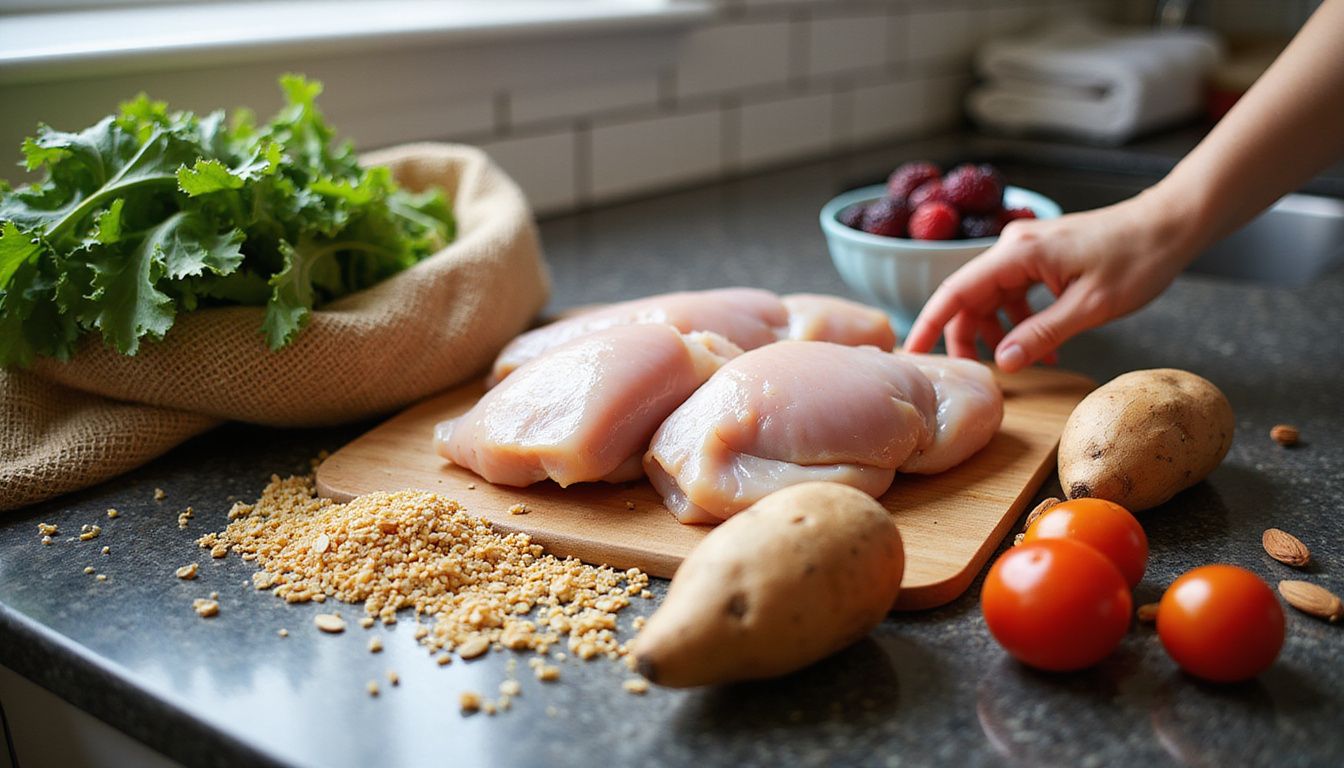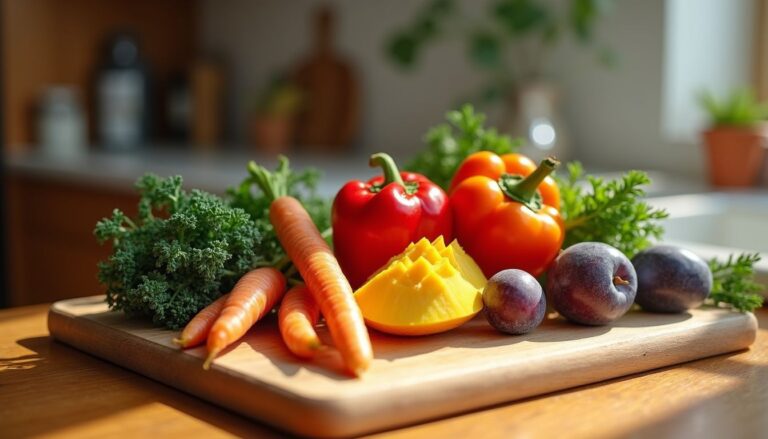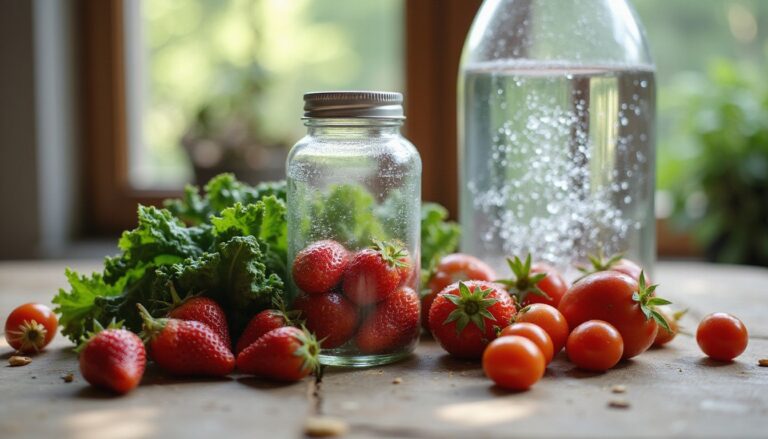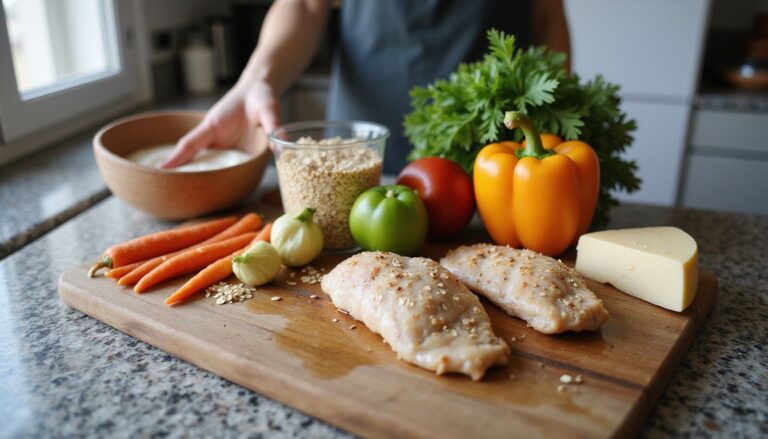Nutrition To Build Muscle: Tips For Gaining Muscle Mass
Our Nutrition Assistant AI Suite will transform your body. You will lose fat, get toned, and build muscle. Gain confidence and optimal health.
If you struggle to gain muscle or feel unsure about foods to eat, you are not alone. Building muscle takes more than extra calories. You need the right mix of protein, carbohydrate, and healthy fat to drive muscle growth.
Research suggests about 1.42 grams of dietary protein per kilogram of body weight per day helps maximize muscle mass when paired with resistance training¹. In this guide, you will get clear tips for meal planning, your core nutrient needs, top protein-rich foods, and which choices can slow progress.
Start with small changes today. Stronger habits add up over time.
¹Morton RW et al., Br J Sports Med 2018;52:376-384.
Key Takeaways
- A daily target near 1.42 grams of protein per kilogram and a calorie surplus of 350 to 500 supports steady muscle gain, based on Morton et al., Br J Sports Med (2018).
- Build meals around high-protein foods such as eggs, chicken breast, salmon, tuna, and Greek yogurt. Add complex carbs like quinoa or brown rice for fuel.
- Healthy fats from avocados, almonds, olive oil, and salmon support hormones and recovery. Keep saturated fat lower for best results.
- Limit ultra-processed snacks high in added sugar, deep-fried foods, high-sodium items, and heavy alcohol intake. These choices can stall recovery and add body fat.
- Space protein evenly across the day, about 20 to 30 grams per meal, to support muscle protein synthesis after resistance training.
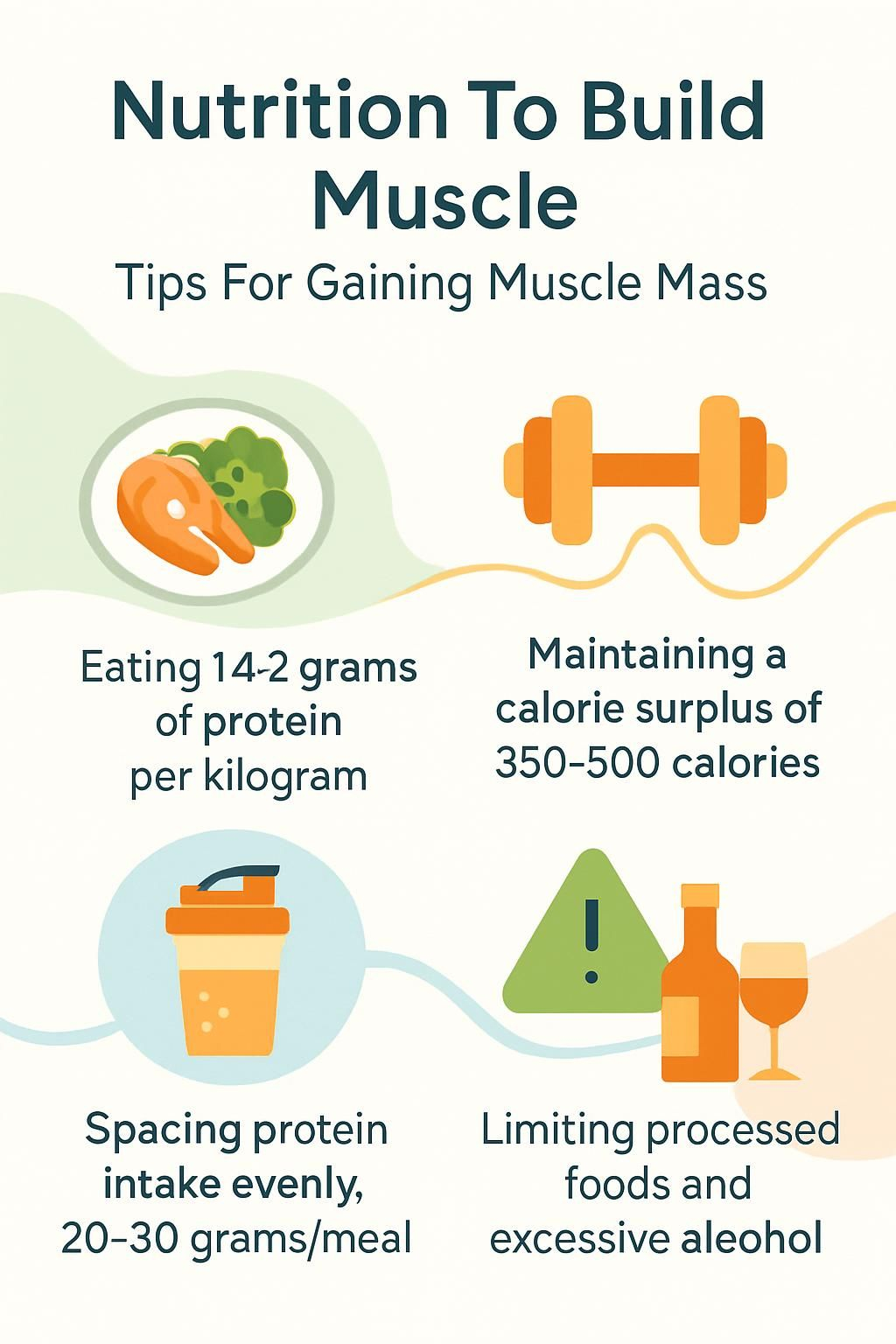
Understanding Muscle Building Nutrition

Nutrition drives your ability to gain strength and muscle. To maximize muscle growth, choose nutrient-dense foods and eat enough to support training demands.
How Do Calories Affect Muscle Growth?
A calorie surplus gives your body energy to build new tissue. Eating more calories than you burn allows your body to add muscle mass, especially with regular resistance training.
Most people do well with a daily surplus of 350 to 500 calories. For example, if you weigh 180 pounds, pair this surplus with high-protein foods like chicken, beans, fish, or dairy.
Tracking food energy with an app helps manage intake and avoid fat gain from low-nutrient choices. Clean bulking means focusing on whole foods instead of candy, soda, and ultra-processed snacks.
“Enough calories plus smart food choices support protein synthesis and successful weight gain.”
Once calories are on track, the next step is getting your macronutrients right.
Why Are Protein, Carbs, and Fats Important for Muscle Gain?
Calories set the stage; macronutrients deliver the results. Protein, carbohydrates, and fats each support muscle in different ways.
Protein provides amino acids, the building blocks for muscle protein synthesis. Many active adults aiming to gain lean muscle target 1.0 to 1.5 grams of protein per kilogram of body weight per day. Animal sources like chicken, beef, fish, milk, eggs, and yogurt provide all essential amino acids. Plant sources such as tofu and soy can also meet needs during resistance training.
Carbohydrates are your main training fuel. They fill muscle glycogen, which powers lifting and other exercise. Choose whole grains, oats, brown rice, pasta, and starchy vegetables like sweet potatoes.
Healthy fats from avocados, nuts, seeds, soybeans, and olive oil support hormone production and recovery. Include all three macronutrients at each meal to support performance and muscle size.
Key Macronutrients for Muscle Gain
Your body needs the right balance of protein, carbohydrate, and fat to grow. Each macronutrient supports muscle mass in a unique way.
What Role Does Protein Play in Building Muscle?
Protein is the building block of muscle tissue. Enough dietary protein helps repair and grow muscle after each workout.
Studies suggest about 1.42 grams of protein per kilogram of body weight per day can maximize muscle growth; many active adults do well with 1.2 to 2.0 grams per kilogram. A complete protein contains all essential amino acids that aid recovery.
After exercise, aim for 20 to 30 grams of high-quality protein, or 0.25 to 0.30 grams per kilogram. This dose boosts myofibrillar protein synthesis and supports strength gains. Moving from the minimum of 0.8 g/kg to around 1.6 g/kg often improves recovery and training results. Good choices include chicken, strained yogurt, tuna, whey protein, or a smoothie with plant protein if you prefer vegan options.
How Do Carbohydrates Help Energy and Recovery?
Carbohydrates fuel your muscles during training. Complex carbs from brown rice, quinoa, oatmeal, and sweet potatoes keep blood sugar steady and energy reliable. One cup of cooked brown rice also provides about 6 grams of protein.
Quinoa offers about 40 grams of carbs per cooked cup and about 8 grams of protein. Oatmeal supplies slow-digesting carbs with roughly 6 grams of protein per serving. After exercise, quicker carbs like potatoes or bread help restore glycogen for faster recovery. Legumes such as lentils add both quality carbs and about 9 grams of protein per cooked cup.
Well-timed carbs shorten recovery windows and prepare you for the next session.
Why Are Healthy Fats Important for Hormones and Health?
Healthy fats do more than add calories. Unsaturated fats from avocados, nuts, seeds, soybeans, and olive oil help your body make hormones like testosterone and estrogen, which support muscle growth and recovery.
Salmon offers about 1.5 grams of omega-3 fats per 3 ounces. Omega-3s support heart health and may ease post-exercise soreness. Almonds provide about 6 grams of protein per ounce, while peanuts offer about 7 grams per ounce, both with useful calories for gaining size.
Fat also helps you absorb vitamins A, D, E, and K. Adding peanut butter to snacks or olive oil to salads can support consistent gains. Choose unsaturated fats more often than saturated fats to support long-term health.
Essential Micronutrients for Muscle Function
Micronutrients are vitamins and minerals. They support muscle function, recovery, and overall health. A varied eating plan helps you meet these needs.
Which Vitamins and Minerals Improve Muscle Recovery?
Vitamins and minerals work behind the scenes to speed recovery. Vitamin B12, found in fish like tilapia and tuna, helps make red blood cells that carry oxygen to working tissues.
Chicken breast supplies niacin and vitamin B6, both involved in using protein for repair. Tuna also adds vitamin A and more B6. Beans and soybeans provide iron, magnesium, phosphorus, and vitamin K, which support energy production and tissue repair. Edamame offers folate, manganese, fiber, protein, and vitamin K in one food.
When I raised my intake of cottage cheese and sardines, I noticed less next-day soreness. Those foods delivered protein along with useful micronutrients.
How Do Omega-3 Fatty Acids Reduce Inflammation?
Omega-3 fats can calm exercise-related inflammation. They block compounds that trigger swelling and soreness after hard training.
Oily fish like salmon or tuna are reliable sources. A 3-ounce salmon serving provides about 1.5 grams of omega-3s. Some people use a 2-gram omega-3 supplement daily to support recovery. These healthy fats can help protect joints and keep training on schedule.
Adding fish to dinner twice a week helped my knees feel better after lifting. It meant fewer missed workouts over time.
Best Foods to Build Muscle
Food choice matters when you want to gain lean muscle. Focus on quality protein, fiber-rich carbs, key minerals, and healthy fats that fit your plan.
What Are the Top Protein-Rich Foods for Muscle Gain?
Prioritize high-protein foods to support growth and recovery. Mix animal, dairy, and plant options across your week.
- Eggs provide about 6 grams of protein per large egg; whole eggs may support repair better than whites alone.
- Chicken breast delivers about 26.7 grams of protein per 3 ounces with little fat, great for building muscle without many extra calories.
- Lean beef, such as 95 percent lean ground beef, has about 148 calories and 6 grams of fat per 3 ounces and offers quality protein.
- Salmon provides about 17 grams of protein per 3 ounces and adds omega-3 fats that may reduce soreness.
- Greek yogurt has about 17 grams of protein per 6 ounces and includes calcium for bone health.
- Tuna offers up to 27 grams of protein in ahi tuna or about 20 grams from canned tuna per 3-ounce serving; it is quick and portable.
- Turkey breast supplies about 26 grams of protein per cooked serving with very little fat.
- Shrimp contains about 19 grams of protein per 3 ounces and is rich in leucine, a key trigger for muscle growth.
- Plant options like beans, lentils, tofu, and tempeh add protein, minerals, and fiber. They help build muscle in vegetarian or vegan diets.
Choosing from these foods helps you get enough protein without relying on highly processed products.
Which Complex Carbohydrates Support Muscle Growth?
Complex carbs provide steady energy and support recovery. They also help you meet calorie needs while keeping you full.
- Quinoa gives about 40 grams of carbohydrates and 8 grams of protein per cooked cup, plus magnesium and phosphorus.
- Oatmeal provides slow-digesting carbs and about 6 grams of protein per cup for lasting energy.
- Brown rice offers high carbohydrates for glycogen and about 6 grams of protein per cup.
- Lentils supply 9 grams of protein and rich complex carbs per cup to support protein synthesis.
- Buckwheat contains about 6 grams of protein per cooked cup and delivers reliable complex carbs.
- Beans bring fiber and about 15 grams of plant protein per cup along with complex carbs for training fuel.
- Chickpeas provide about 45 grams of carbs, 13 grams of fiber, and 15 grams of protein per canned cup, great for meal prep.
- Whole-grain oats and bread support steady glucose release and suit long workouts or heavy training days.
I often use oatmeal before morning lifts. The slow carbs keep my energy stable for longer sessions.
What Healthy Fats Should You Include in Your Diet?
Healthy fats support hormones and recovery. They also add calories in a small volume, which helps when you need to gain weight.
- Avocados supply monounsaturated fat and help with vitamin absorption. Add slices to salads or blend into smoothies.
- Olive oil provides monounsaturated fat and antioxidants. Use it for dressings or drizzle over cooked vegetables.
- Almonds offer about 6 grams of protein per ounce and are calorie dense. Add to yogurt or eat as a snack.
- Salmon includes about 1.5 grams of omega-3s per 3 ounces; these fats support recovery after training.
- Peanuts contain about 7 grams of protein and healthy unsaturated fats per ounce. Choose unsalted to limit sodium.
- Soybeans provide protein and unsaturated fats that support training and hormone function.
- Pumpkin seeds supply about 8 grams of protein per ounce plus magnesium for muscle function.
- Bison offers around 22 grams of lean protein per 3 ounces with less fat than many beef cuts.
- Cow’s milk balances protein, carbs, and fat in one easy option for post-workout recovery.
Build meals with these fats to meet calorie goals while protecting health.
What Are Effective Plant-Based Protein Options?
Plant proteins can fully support growth when planned well. They bring fiber and minerals in addition to protein.
- Soybeans deliver about 16 grams of protein in a half cup cooked and supply helpful unsaturated fat.
- Edamame contains about 18 grams of protein and 8 grams of fiber per cup to support muscle and gut health.
- Tofu offers around 10 grams of protein per half cup raw or about 9 grams per 3 ounces, with a low calorie cost.
- Beans provide about 15 grams of protein per cooked cup along with iron, magnesium, and fiber.
- Lentils supply about 9 grams of protein per cup plus B vitamins for energy metabolism.
- Chickpeas give about 15 grams of protein and 45 grams of carbs per canned cup for long workouts.
- Buckwheat provides about 6 grams of protein per cooked cup and useful minerals like magnesium.
- These foods also add fiber, iron, folate, and B vitamins that support overall health.
When I needed more calories without more poultry or pork, adding soybeans and lentils kept my strength climbing.
Foods to Limit or Avoid for Muscle Growth
Some choices can slow progress or add unwanted body fat. Tightening this list helps you gain lean muscle faster.
Why Avoid Processed Foods with Added Sugars?
Soda, candy, pastries, and sugary cereals add calories without nutrients. Many also include unhealthy fats and extra sodium.
These foods displace protein and micronutrients that your muscles need for repair. Refined carbs lack fiber and essential vitamins. Cutting them usually improves energy and appetite control.
During one heavy training block, I reduced sweet snacks. My workouts felt steadier, and my meal plan was easier to follow.
How Does Excessive Alcohol Affect Muscle Growth?
Too much alcohol slows recovery and disrupts hormones that support growth. It can interfere with protein use in muscle, which limits protein synthesis.
Heavy drinking also reduces absorption of key nutrients like calcium and vitamin D. Alcohol adds empty calories and can increase inflammation after exercise. High intake often leads to fat gain instead of new muscle.
If you choose to drink, limit your intake, especially around training days.
What Are the Risks of Deep-Fried and High-Sodium Foods?
Deep-fried foods pack many calories from fat. Since fat has 9 calories per gram, fried items can push you into excess quickly.
High-sodium foods, such as processed meats and salty snacks, can add more than 1,500 milligrams per serving. This can raise blood pressure and increase water retention, which may affect performance.
Switching from fried takeout to roasted chicken and fruit helped my recovery and hydration during a tough training cycle.
Supplements for Muscle Building
Supplements can help, but they work best on top of a solid diet and consistent exercise. Focus on food first, then fill gaps.
What Are the Benefits of Whey Protein?
Whey protein provides a complete protein that digests quickly. It is useful after training when your muscles need amino acids fast.
Research shows whey protein supports gains when paired with resistance training. If you struggle to meet daily protein needs with food, whey is a convenient tool. Check labels for added sugars. Avoid whey if you have a dairy allergy.
How Does Creatine Enhance Strength?
Creatine is stored in muscle and helps fuel short, intense efforts, such as heavy lifting or sprints. A common dose is 3 to 5 grams per day.
Studies report greater gains in size and strength with creatine plus training compared with training alone. Some reports have raised questions about long-term risks in certain groups, and supplement quality varies.
I tried creatine for six weeks during a strength phase and lifted heavier with less fatigue between sets. Talk with a healthcare professional before starting any supplement, especially if you have medical conditions.
Can BCAAs Help with Muscle Recovery?
BCAAs are branched-chain amino acids: leucine, isoleucine, and valine. Leucine helps trigger protein synthesis after training.
Foods like eggs, cottage cheese, shrimp, and nuts already supply BCAAs. Research on extra BCAA supplements is mixed. Some people notice less soreness, while others see little benefit compared with eating enough total protein.
If your daily protein is high quality and adequate, you may not need BCAA powders. Whole foods give broader nutrition for recovery and health.
Timing and Frequency of Meals
Meal timing supports training and recovery. Consistent patterns help you use calories and protein well.
Why Is Post-Workout Nutrition Important?
Training uses glycogen and breaks down muscle proteins. A post-workout meal with 20 to 30 grams of protein helps repair and rebuild tissue.
Aim for about 0.25 to 0.30 grams of protein per kilogram in this meal. Add fast-digesting carbs like fruit or rice to restore glycogen quickly. This combo speeds recovery and can reduce soreness.
When I eat a banana with a nut butter sandwich right after lifting, I feel better the next day compared with waiting to eat.
How Should You Space Protein Intake Throughout the Day?
Spread protein evenly to support growth. Aim for 20 to 30 grams of protein at each meal or snack.
For example, choose eggs or Greek yogurt at breakfast, a chicken salad or nut spread sandwich at lunch, and fish or tofu at dinner. Tracking intake can help you see gaps and plan ahead.
Hydration and Its Role in Muscle Growth
Water supports muscle contraction, nutrient delivery, and recovery. Hydration should match your training load and climate.
How Much Water Do You Need for Muscle Function?
Even mild dehydration can reduce performance and power output. Hard training raises fluid needs, especially in heat.
Many athletes need about 16 to 24 ounces of fluid per hour of intense activity, depending on size and environment. Pale yellow urine usually signals good hydration.
Carrying a reusable bottle helps you stay on track. Adjust your intake for longer or hotter sessions.
What Role Do Electrolytes Play in Performance?
Electrolytes, such as sodium, potassium, and magnesium, help regulate fluid balance and nerve signals. You lose them in sweat.
In hot weather or long workouts, sports drinks can replace losses quickly. Foods like beans and soybeans boost magnesium without supplements. Replenishing electrolytes helps prevent cramps and fatigue.
Tips for Gaining Muscle Mass
You can gain muscle faster with smart eating, consistent training, and fewer roadblocks. Here is how to put the pieces together.
How Can You Combine Nutrition with Resistance Training?
Pair resistance training with a daily calorie surplus of 350 to 500. Choose nutrient-dense meals instead of ultra-processed foods.
Target 1.2 to 2.0 grams of protein per kilogram of body weight each day. Include protein at every meal and after workouts, about 20 to 30 grams post-exercise. Eat enough carbs before sessions to power your lifts, then refuel after. Include healthy fats to support hormones and recovery.
Adjust your plan as training volume changes. Consistency produces steady results.
Why Monitor Your Progress and Adjust Calories?
Tracking keeps your plan honest. Use an app to log calories and protein daily.
If you gain more fat than expected, lower calories slightly. If strength stalls and weight is flat, increase calories. Weekly check-ins help you make small, smart changes that keep you moving forward.
How Important Is Consistency in Diet and Workouts?
Consistency turns good plans into gains. A regular meal schedule with steady protein supports muscle building all day.
Structured training helps you apply progressive overload, which grows strength and size. Making the same solid choices, day after day, leads to visible results. I saw reliable progress once I stopped skipping meals and workouts.
Frequently Asked Questions
These quick answers help you turn guidelines into action.
How Many Calories Should You Eat to Gain Muscle?
Start with a calorie surplus of 350 to 500 above your daily needs. If you weigh 180 pounds, use an app to estimate your baseline and add from there. Active adults often need more because hard training burns many calories.
Set protein at 1.2 to 2.0 grams per kilogram. For someone around 180 pounds, that often equals 100 to 160 grams per day. The rest of your calories should come from carbs and healthy fats that support training and recovery.
During high school football, I tracked calories weekly and adjusted portions as workouts got harder. Simple changes made a big difference.
Can You Build Muscle Without Supplements?
Yes. You can gain muscle with whole foods if you meet your calorie and protein goals. Eggs, chicken breast, beans, lentils, tofu, and dairy products are reliable protein foods.
Whole foods also reduce risks that can come with some supplements, such as added sugars or poor quality control. Use supplements for convenience, not as a replacement for a strong meal pattern.
What Are the Best Fast-Digesting Foods After Workouts?
Whey protein shakes digest quickly and are a strong choice after training. White bread or white rice provide fast carbs to refill glycogen. Bananas supply potassium and quick energy.
Greek yogurt delivers about 17 grams of protein per 6 ounces. Low-fat cottage cheese provides about 28 grams per cup with leucine, which helps trigger muscle building. Chicken breast and tuna are lean options, and salmon adds omega-3 fats along with protein.
Pair a quick carb, like rice or fruit, with a rapid protein, like whey or yogurt, to maximize recovery.
Conclusion
Growing muscle requires smart nutrition and consistent resistance training. Focus on high-protein foods like eggs, chicken breast, salmon, tuna, and Greek yogurt to support muscle growth.
Use complex carbohydrates such as brown rice and quinoa for training fuel. Add healthy fats from salmon, almonds, avocado, and olive oil to support hormones and overall health. Stay hydrated and time meals so recovery is faster.
Track calories and protein daily. Aim for about 1.42 grams of protein per kilogram of body weight and a calorie surplus of 350 to 500 for steady progress^1^. Limit ultra-processed foods, deep-fried items, high-sodium snacks, and heavy alcohol use, since these choices can slow gains.
Consistency wins. Keep doing the basics well and your muscle mass will grow. For medical concerns or supplement questions, consult a qualified healthcare professional.
^1 Morton RW et al., “A systematic review, meta-analysis, and meta-regression of the effect of protein supplementation on resistance training–induced gains in muscle mass.” Br J Sports Med (2018)
FAQs
1. What are the most important nutrients for gaining muscle mass?
Protein, carbohydrates, and healthy fats are vital for building muscle. Protein helps repair and grow tissue; carbohydrates provide energy for workouts; healthy fats support hormone production. Research shows that adults aiming to build muscle should consume 1.6 to 2.2 grams of protein per kilogram of body weight each day (Morton et al., 2018).
2. How often should I eat to support muscle growth?
Eating every three to four hours can help maintain a steady supply of nutrients needed for recovery and growth. Consistent meal timing supports stable blood sugar levels and maximizes protein synthesis.
3. Can supplements help with gaining muscle mass?
Supplements like whey protein or creatine may aid in reaching nutrition goals if whole foods do not meet your needs (Phillips & Van Loon, 2011). However, focus on a balanced diet first before adding supplements.
4. What is one practical tip from personal experience about eating for muscle gain?
Preparing meals ahead makes it easier to get enough calories and nutrients throughout the week. For example, cooking lean meats such as chicken breast in bulk helped me avoid skipping meals during busy days at work.
Summary: Eating enough protein, carbs, and healthy fats is key when trying to build muscle mass; regular meals keep nutrient levels steady; some supplements can be useful but food comes first; planning meals ahead saves time while supporting consistent progress toward your fitness goals.
References:
– Morton RW et al., “A systematic review, meta-analysis and meta-regression of the effect of protein supplementation on resistance training-induced gains in muscle mass and strength in healthy adults,” Br J Sports Med 2018.
– Phillips SM & Van Loon LJ., “Dietary protein for athletes: from requirements to optimum adaptation,” J Sports Sci 2011

